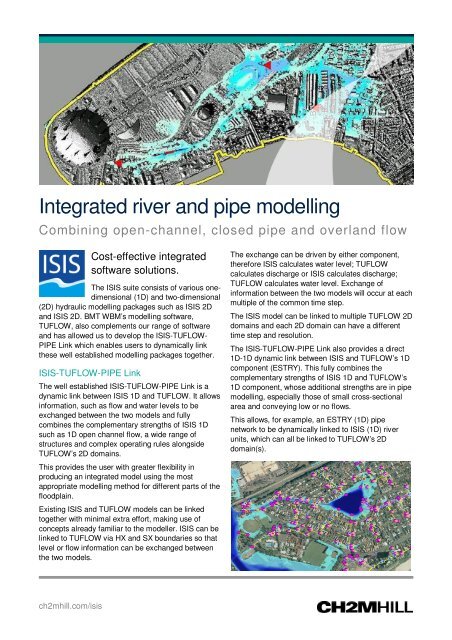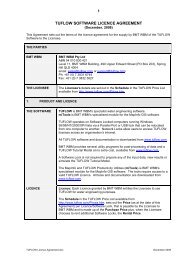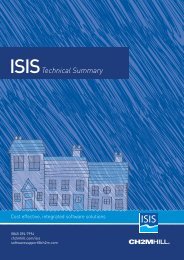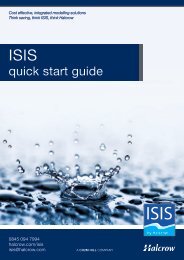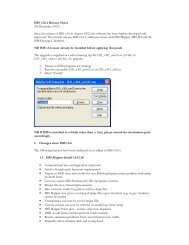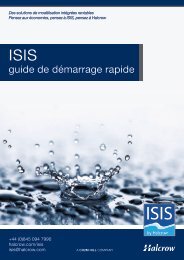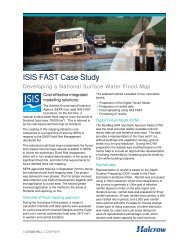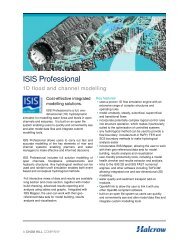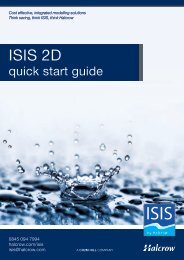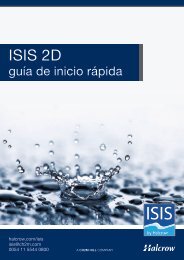ISIS-TUFLOW-PIPE Link - Halcrow
ISIS-TUFLOW-PIPE Link - Halcrow
ISIS-TUFLOW-PIPE Link - Halcrow
Create successful ePaper yourself
Turn your PDF publications into a flip-book with our unique Google optimized e-Paper software.
Integrated river and pipe modelling<br />
Combining open-channel, closed pipe and overland flow<br />
Cost-effective integrated<br />
software solutions.<br />
The <strong>ISIS</strong> suite consists of various onedimensional<br />
(1D) and two-dimensional<br />
(2D) hydraulic modelling packages such as <strong>ISIS</strong> 2D<br />
and <strong>ISIS</strong> 2D. BMT WBM’s modelling software,<br />
<strong>TUFLOW</strong>, also complements our range of software<br />
and has allowed us to develop the <strong>ISIS</strong>-<strong>TUFLOW</strong>-<br />
<strong>PIPE</strong> <strong>Link</strong> which enables users to dynamically link<br />
these well established modelling packages together.<br />
<strong>ISIS</strong>-<strong>TUFLOW</strong>-<strong>PIPE</strong> <strong>Link</strong><br />
The well established <strong>ISIS</strong>-<strong>TUFLOW</strong>-<strong>PIPE</strong> <strong>Link</strong> is a<br />
dynamic link between <strong>ISIS</strong> 1D and <strong>TUFLOW</strong>. It allows<br />
information, such as flow and water levels to be<br />
exchanged between the two models and fully<br />
combines the complementary strengths of <strong>ISIS</strong> 1D<br />
such as 1D open channel flow, a wide range of<br />
structures and complex operating rules alongside<br />
<strong>TUFLOW</strong>’s 2D domains.<br />
This provides the user with greater flexibility in<br />
producing an integrated model using the most<br />
appropriate modelling method for different parts of the<br />
floodplain.<br />
Existing <strong>ISIS</strong> and <strong>TUFLOW</strong> models can be linked<br />
together with minimal extra effort, making use of<br />
concepts already familiar to the modeller. <strong>ISIS</strong> can be<br />
linked to <strong>TUFLOW</strong> via HX and SX boundaries so that<br />
level or flow information can be exchanged between<br />
the two models.<br />
The exchange can be driven by either component,<br />
therefore <strong>ISIS</strong> calculates water level; <strong>TUFLOW</strong><br />
calculates discharge or <strong>ISIS</strong> calculates discharge;<br />
<strong>TUFLOW</strong> calculates water level. Exchange of<br />
information between the two models will occur at each<br />
multiple of the common time step.<br />
The <strong>ISIS</strong> model can be linked to multiple <strong>TUFLOW</strong> 2D<br />
domains and each 2D domain can have a different<br />
time step and resolution.<br />
The <strong>ISIS</strong>-<strong>TUFLOW</strong>-<strong>PIPE</strong> <strong>Link</strong> also provides a direct<br />
1D-1D dynamic link between <strong>ISIS</strong> and <strong>TUFLOW</strong>’s 1D<br />
component (ESTRY). This fully combines the<br />
complementary strengths of <strong>ISIS</strong> 1D and <strong>TUFLOW</strong>’s<br />
1D component, whose additional strengths are in pipe<br />
modelling, especially those of small cross-sectional<br />
area and conveying low or no flows.<br />
This allows, for example, an ESTRY (1D) pipe<br />
network to be dynamically linked to <strong>ISIS</strong> (1D) river<br />
units, which can all be linked to <strong>TUFLOW</strong>’s 2D<br />
domain(s).<br />
ch2mhill.com/isis
<strong>TUFLOW</strong>’s 1D component includes industry leading<br />
algorithms for modelling manholes and time-varying<br />
energy losses at manholes and pipe junctions.<br />
Manholes can be specified via GIS layers or<br />
automatically created at closed pipe junctions.<br />
Several mechanisms for calculating energy losses at<br />
manholes are available. The most sophisticated is an<br />
enhanced Engelhund approach that re-calculates the<br />
energy losses every timestep based on the manhole<br />
shape, expansion and contraction of flow, flow<br />
distribution between pipes, angles of approach, invert<br />
drops and other characteristics.<br />
Combines the capability of <strong>ISIS</strong> for dealing with<br />
structures and that of <strong>TUFLOW</strong> for dealing with<br />
rapid flooding and drying processes, both of which<br />
are critical to the accuracy of flood prediction.<br />
Existing <strong>ISIS</strong> and <strong>TUFLOW</strong> models are quickly and<br />
easily converted for use in <strong>ISIS</strong>-<strong>TUFLOW</strong><br />
Combines open-channel, closed pipe and overland<br />
flow, enabling an integrated approach to modelling<br />
Delivering value – case study<br />
<br />
Integrated urban modelling, Coventry, UK<br />
The <strong>ISIS</strong>-<strong>TUFLOW</strong>-<strong>PIPE</strong> <strong>Link</strong> has been used to<br />
model combined fluvial and pluvial sources of<br />
potential flooding in Coventry. This built on an existing<br />
<strong>ISIS</strong> model of the main watercourse, linking to<br />
underground (1D) and overland (2D) flow in <strong>TUFLOW</strong>.<br />
A rainfall event was then applied to the whole area in<br />
<strong>TUFLOW</strong>, and fluvial inputs to the <strong>ISIS</strong> model.<br />
The <strong>ISIS</strong>-<strong>TUFLOW</strong>-<strong>PIPE</strong> <strong>Link</strong> enables an integrated<br />
approach to modelling, combining open-channel,<br />
closed pipe and overland flow, suitable for modelling<br />
flood risk in urban areas, amongst other scenarios.<br />
In combination with <strong>ISIS</strong>, the ability to dynamically link<br />
storm water drainage networks and overland flow<br />
makes <strong>TUFLOW</strong> extremely powerful for modelling<br />
urban catchments. This could involve interactions<br />
between roads and the underground piped system.<br />
Large drainage networks with tens of thousands of 1D<br />
elements (pipes, open drains, pit inlets and manholes)<br />
connected to millions of 2D cells have been modelled.<br />
Key benefits of the <strong>ISIS</strong>-<strong>TUFLOW</strong>-<strong>PIPE</strong> <strong>Link</strong>:<br />
Combines the complementary strengths of <strong>ISIS</strong><br />
(1D), <strong>TUFLOW</strong> (2D) and ESTRY (1D)<br />
Provides the user with greater flexibility in<br />
producing an integrated model<br />
An existing <strong>ISIS</strong> model is fully compatible with an<br />
<strong>ISIS</strong>-<strong>TUFLOW</strong> linked model<br />
Permits detailed modelling of different parts of the<br />
floodplain which would not be possible in just <strong>ISIS</strong><br />
or <strong>TUFLOW</strong><br />
In combination with <strong>ISIS</strong>, the ability to dynamically<br />
link storm water drainage networks and overland<br />
flow makes <strong>TUFLOW</strong> extremely powerful for<br />
modelling urban catchments<br />
All three components were linked dynamically,<br />
demonstrating the interaction between the differing<br />
constituents of a complex urban network. This study<br />
represents how easily the drainage network could be<br />
input as 1D components in <strong>TUFLOW</strong>, linked to the<br />
existing <strong>ISIS</strong> model of the open channel and culverted<br />
watercourses and allied to the 2D overland modelling<br />
capabilities of <strong>TUFLOW</strong> with multiple sources of<br />
flooding input.<br />
Contact us<br />
Vijay Jain, Software sales manager<br />
tel +44 (0)845 094 7990<br />
email softwaresales@ch2m.com<br />
Software technical support<br />
tel +44 (0)845 094 7994<br />
email softwaresupport@ch2m.com<br />
ch2mhill.com/isis


